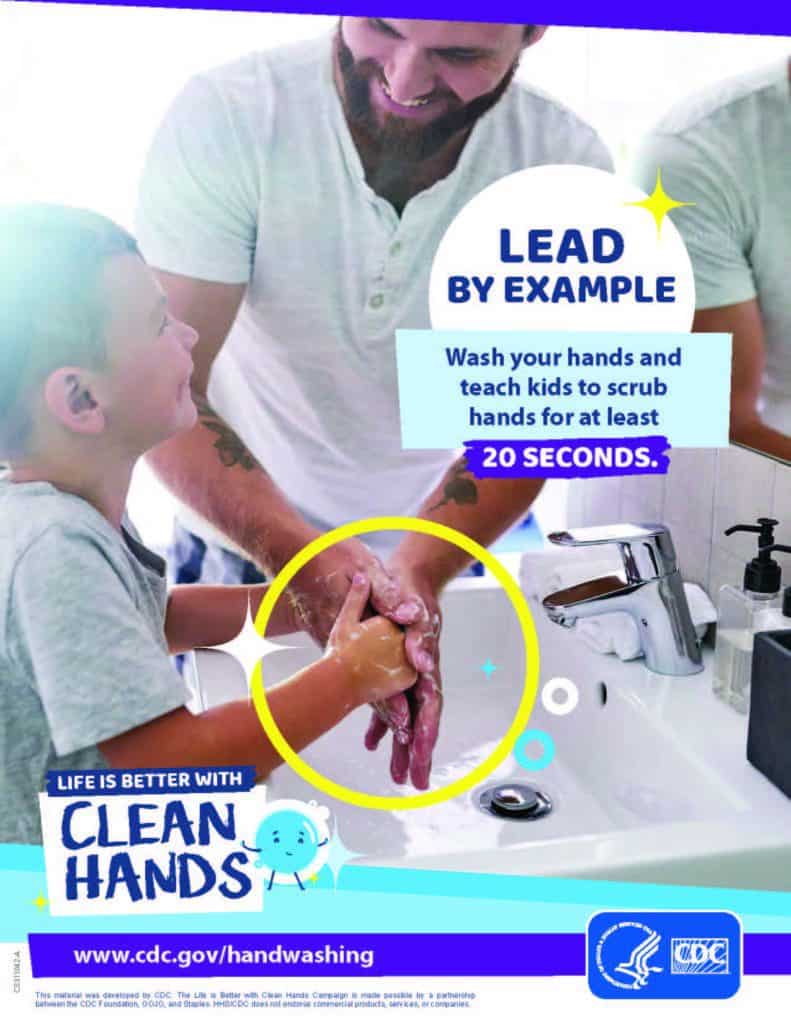No matter what time of year, concern for our family’s health is a usually a priority. The Centers for Disease Control and Prevention estimates that there are between 9 million and 45 million cases of flu reported each year. Add to this the concern over other disease outbreaks and it’s no wonder that keeping our kids healthy this year remains at the forefront of our minds.
It is easy as parents to worry about how illness might impact our families. Paul tells us in Philippians 4:6-7, “Do not be anxious about anything, but in everything by prayer and supplication with thanksgiving let your requests be made known to God. And the peace of God, which surpasses all understanding, will guard your hearts and your minds in Christ Jesus.” As we keep prayerful watch over our families, we can also benefit from a few practical tips to keep our kids healthy this next year.
Ten Practical Ways To Keep Your Kids Healthy This Year
1. Wash Your Hands Frequently
Did you know that there is a correct technique for washing your hands? Using soap and warm water, lather your hands for at least twenty seconds before rinsing them. Your kids can hum “Happy Birthday” or “Twinkle, Twinkle, Little Star” if they need some help timing themselves. It is very important for everyone to wash their hands before or after they’ve prepared or eaten food, used the bathroom, touched an animal or come in contact with someone who is sick.
Washing your hands early and often will help prevent the spread of illness, and will help keep your family healthy. When it’s not possible for you or your kids to wash your hands, use hand sanitizer to clear away the germs. Keep in mind that hand sanitizer doesn’t kill all the germs that could be present on your hands. There is no substitute for a good hand washing!
2. Sanitize Your Stuff
Be sure to sanitize items that you and your kids use frequently. One of the most important items to clean is our cell phone: it is constantly being held, in use, or set down in places that may not be clean. In your home, frequently clean high-traffic items and areas such as refrigerators, microwaves, bathrooms, and sinks. Do laundry often, especially towels and clothes that have been worn outside of the home. Engage your kids by having them help clean their rooms. Keeping the things you use clean will help minimize your exposure to any germs that may be lingering.
3. Take Vitamins
Walking down the vitamin aisle in the local drugstore, you might be overwhelmed with the colorful wall of vitamin bottles and labels. If there is a vitamin or herb that you are looking for, you can likely find it here. Vitamins have become an important part of supplementing our diets since we do not consume the necessary quantities of certain vitamins and minerals from the food we eat. Our bodies use vitamins and minerals to help our body function properly and boost our immune systems. In the winter, especially, certain vitamins like vitamin D tend to be lacking because our families do not get outside and into the sunlight as often. Vitamin D plays a critical part in how our immune system functions.
Do some research and talk with your doctor about which vitamins would be best for your family to add into their routine. Most of the time, a well-balanced diet provides all the vitamins a person needs for their daily intake. If your doctor advises it, supplemental vitamins may be helpful in rounding out your nutritional needs.
4. Stay Hydrated
It is important to stay hydrated every day. The amount of water that your kids should drink per day will depend on their age and weight. Generally, kids and teens should drink about 6-8 glasses of water per day. For parents, women should typically drink 9 glasses or water a day and men should drink 13. If you are exercising, sweating, the weather is hot, or you have any sort of illness, more water may be necessary to keep you well hydrated.
Water is critical in keeping our bodies healthy and functioning properly. Our bodies are made up of 60% water. Water helps distribute nutrients to our cells and flushes unwanted viruses and bacteria from our systems. Drinking plenty of water can keep our kids healthy.
5. Eat Healthy Foods
A lot of recent research has focused on the idea that a happy gut means a healthy immune system. Scientists have been researching the digestive tract and the healthy microbes that live inside of it. These healthy bacteria play a critical part in our whole body’s health. Making sure that our families are eating good food and balanced diets can help keep the gut happy and our immune systems high.
Make a plan to cook healthy meals with your family. Invite your children to help plan which meals to make and prepare them together. There is nothing quite like bonding over cooking delicious food! It may also be a good idea to supplement your diets with a probiotic. Probiotics can be found in foods such as yogurt and can give the digestive system and the healthy bacteria inside your gut a boost.
6. Stay Active
Exercising and staying physically active is a great way to keep your body in shape. Keeping your heart rate up will increase your body’s resistance to viruses and bacteria. Staying active is an excellent way to keep our kids healthy.
Come up with ideas for how you and your family to stay active together. It might be an evening walk or bike ride, a game of soccer or shooting some basketball hoops. In the winter, bundle up and go sledding, skiing, or build a snowman. The possibilities are endless!
7. Get Plenty of Sleep
‘Get plenty of rest’ sounds like a foreign concept with the busy lifestyle our families often lead. But making sure that your family gets enough sleep will help them mentally and physically. Sleep helps strengthen the body and improves its immune response. White blood cells – which combat harmful bacteria and viruses in the body – are created while we sleep. If anyone in your family does catch the cold or the flu, making sure that he or she gets sufficient sleep is critical for a speedy recovery. Without rest, an illness can tend to drag out for a longer amount of time or possibly become more serious.
8. Stop Sharing
Make sure that your kids know to keep their personal items, food, and drinks to themselves and not to share them with anyone else. Simply sharing a sip of a drink can allow germs to spread from one person to another.
Germs can easily enter the body through the eyes, nose and
mouth. Keeping our hands away from the face can prevent germs from getting in
through these entry points.
9. Keep Your Distance From Illness
Throughout the gospels, Jesus visited with the sick and offered them comfort and healing. Likewise, he charges us to care for and comfort those who are sick. While we should show love to those who are battling illness, we should also be wise in choosing to expose our families to certain illnesses. Just as the current stay at home orders suggest, it is best for our families to stay home and minimize contact with people who are sick until they are better. Instead, call friends or family on the phone or through a video conferencing app like Zoom or Skype. You can also write letters or emails to say hello. There are many ways to show love to others while social distancing.
If you or your kids have caught any illness, try to minimize your contact with other people in your home. If at all possible, try to isolate yourself to a few areas in your house so that you are not spreading germs throughout your home. If you do touch an item that is shared with other family members (like the TV remote), be sure to sanitize it when you’re done.
10. Teach Cough Etiquette
It’s important to teach your kids cough etiquette. If they cough or sneeze, whether it be from allergies or an illness, teach them to cough or sneeze into their elbow, and not their hand. If your child sneezes, have them sneeze or blow their nose into a disposable tissue. Then throw it away immediately. Next, have your kids always wash their hands or use hand sanitizer after coughing or sneezing to prevent the spread of any illness.
These ten tips will help keep your family and kids healthy through the coming year so that you can spend more time focusing on growing and learning together. As John wrote, “Beloved, I pray that all may go well with you and that you may be in good health, as it goes well with your soul” (3 John 1:2).
© 2020 Focus on the Family. All rights reserved.
























